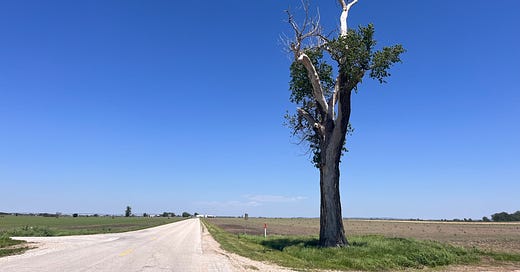
The feathers blanketing the river some 60 yards wide mystified Meriwether Lewis for miles: glimmering, wrinkling under the keelboat bow and its wake, resisting with their lightness the drowning pull of gravity, until the expedition finally discovered their source: a flock of pelicans, now standing on a sandbar, gulping fish in their big, “bladder-like” pouches.
Lewis had never seen pelicans before this day on the Missouri River near present-day Little Sioux, Iowa in 1804. He had never seen them, but recognized them. He wrote in his journal that pelicans wintered in Florida and the Gulf Coast, although Lewis had never been to Florida or New Orleans. He had read about pelicans before-- probably had seen etchings of their shape and descriptions of their unique pouch. So it was not a moment of discovery. It was a moment of recognition.
This is one of those remarkable things that we never remark on: our worlds are larger than our geographies. Most of our moments, if we are awake to them at all, are moments of recognition, not discovery.
People travel. People form mnemonic devices to help carry stories back from their travels, or to pass them forward to new generations. People paint on cave walls, form alphabets, carve words and numbers on stone, scratch them on parchment, mechanically impress them on paper. Sound is also scratched onto vinyl, magnetized and digitized, transferred through cables and in inaudible waves across space.
People like Meriwether Lewis grow up reading books. People like me grow up reading the backs of cereal boxes and end up doomscrolling the news on social media.
And our little worlds get bigger. Or at least, they seem to. If Meriwether Lewis had never actually seen a pelican in real life, it would have continued to fly around in his head as a mythical creature, like a unicorn or centaur--or the one I just learned about: Amphisboena, a snake or worm with a head on each end. The creature is mentioned in John Milton’s Paradise Lost. God punishes Satan’s legions by turning them into various kinds of snakes, one of which is Amphisboena.
This ability to create worlds that we don’t physically interact with is universal. Information flies around in our minds searching for real-world places to land on. And when book-pelicans suddenly materialize as real world pelicans, something clicks, that wonderful feeling of recognition.
All this is so universal that we don’t think about it. We’re like spawning salmon struggling upriver, leaping into the air where, for the first time in their lives, they glimpse the water they breathe. Our climate emergency is so stark, the stakes so high, that we don’t recognize what a miracle it is that at least some of us recognize the emergency for what it is. It wasn’t too long ago that scientists traveled to far-flung places in the world with new-fangled lenses and time pieces to calculate longitude. Now we know current and historic weather patterns from around the world. And now we’re about to externalize all that knowledge to artificial intelligence, just as we externalized knowledge before, into poems and words, cereal boxes and bingeables. Is the change to come really a change in kind? Or is it just a change in degree?
I wouldn’t mind being an Amphisboena with two heads, one facing forward, one facing back, swapping stories back and forth, not always agreeing on which way is forward and which way is back-- who is the discoverer and who is the recognizer. I don’t know if the mythical creature is big or small, but the world in its dual mind must be huge
.



This actually calmed me with the onslaught of serpentine news. Made me wonder instead of worry.
I had to look up "amphisboena." Such a nice concept!